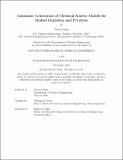Automatic Generation of Chemical Kinetic Models for Biofuel Oxidation and Pyrolysis
Author(s)
Dong, Xiaorui
DownloadThesis PDF (42.38Mb)
Advisor
Green, William H.
Terms of use
Metadata
Show full item recordAbstract
Biofuels hold great promise for reducing greenhouse gas emissions and boosting engine performance. Modeling biofuel combustion and pyrolysis chemistry with chemical kinetic models allows for high-throughput evaluation of their performance under various conditions. These models, typically comprising hundreds of species and thousands of elementary reactions, provide quantitative predictions for the investigated systems. While manually creating such mechanisms is labor-intensive and requires extensive knowledge, reaction mechanism generation software, such as the Reaction Mechanism Generator (RMG), greatly facilitates model development by automating the selection of relevant species and reactions, as well as estimating their thermochemical, kinetic, and transport parameters. Despite the advances in these software packages and their success in modeling small, simple conventional fuels, their application to novel, under-explored biofuels is often limited due to a lack of knowledge in the relevant chemical space. This gap can be bridged by expanding the software's access to accurate thermochemical and kinetic parameters. However, these data are scarce, and their acquisition, typically via quantum chemical calculations, is challenging on a large scale.
This thesis addresses these challenges by developing automated workflows to enhance the calculation of accurate thermochemical and kinetic parameters, thereby extending the capabilities of RMG for biofuel modeling. First, an automatic thermochemistry calculation workflow is implemented and integrated into the chemical kinetic model development process. The significant improvement in computational capacity enables an iterative approach to model generation and refinement, where the thermochemistry of hundreds of molecules is refined in each iteration. This approach is validated through the modeling of light alkene combustion chemistry, resulting in a model that accurately predicts key combustion properties and outperforms other well-regarded models. This study highlights the necessity of sufficient refinement iterations for a comprehensive exploration of the relevant chemical space and the convergence of critical species and reactions in the chemical kinetic model. This approach is then applied to model less-studied biofuels, such as butyl acetate isomers and tetramethylethylene. By incorporating key kinetic parameters from literature and quantum chemical calculations, along with iteratively refined thermochemistry, the developed models demonstrate strong predictive capabilities. These models agree with experiments conducted after their development and reveal important reaction pathways in the studied systems.
Additionally, this thesis enhances the acquisition of accurate kinetic parameters through the simultaneous development of software, datasets, and data-driven models. RDMC, a cheminformatics software, is developed, featuring toolkits for elementary reaction analysis and end-to-end automated workflows for generating molecular and transition state conformers. A dataset covering nine reaction types relevant to combustion and pyrolysis radical chemistry is created using the RDMC workflow. Concurrently, another radical reaction dataset is curated, covering different reaction types. In total, the two datasets introduce high-quality elementary reaction data for over 11,000 radical reactions. Eventually, a graph neural network is trained on the new dataset for fast kinetic parameter estimation that can potentially benefit chemical kinetic model development.
Date issued
2024-09Department
Massachusetts Institute of Technology. Department of Chemical EngineeringPublisher
Massachusetts Institute of Technology